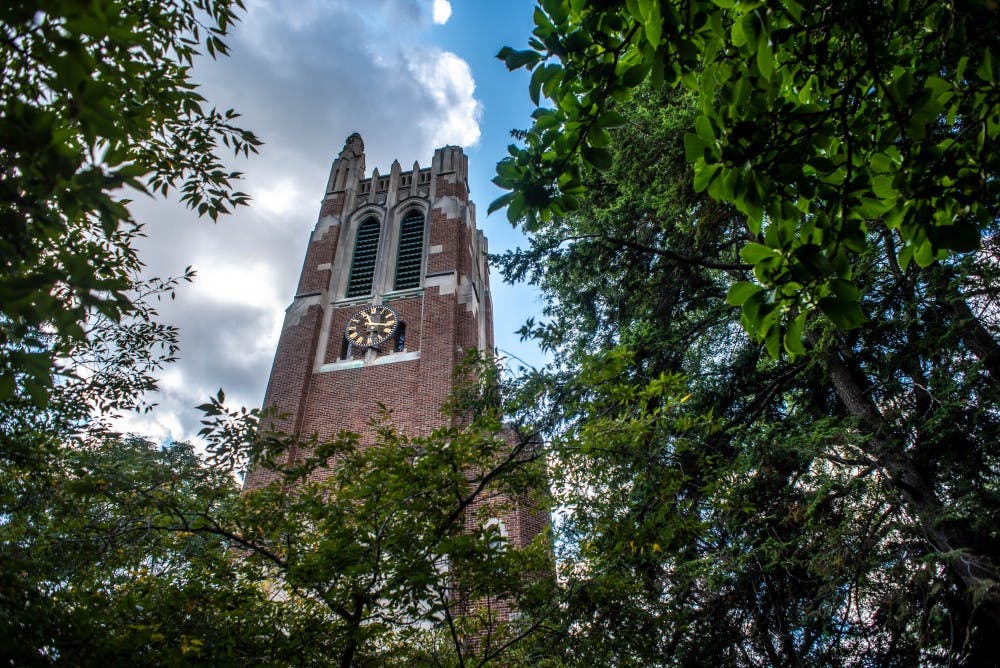A 75-page report outlining the results of a survey conducted by Michigan State University’s Relationship Violence and Sexual Misconduct, or RVSM, Expert Advisory Workgroup was released Thursday.
Launched in March, the survey now has over 15,000 responses. The results outline the thoughts students, faculty and staff have regarding MSU's campus climate around sexual assault and misconduct.
The survey was analyzed by an independent research organization, RTI International.
“Understanding the problems that our campus members face and creating solutions to making our environment safe are important as we work to change our culture around these issues,” MSU President Samuel L. Stanley Jr. said in a university press release. “This new base of knowledge will guide us in creating our strategic plan going forward.”
One of Stanley’s main goals when he took office as president in August was to create a better climate regarding sexual assault. To assist in this process, he appointed two advisors to address sexual misconduct.
“We needed a comprehensive assessment of the climate at MSU for students, faculty and staff,” adviser to the president on RVSM issues and professor of psychology Rebecca Campbell said in the press release. “MSU has never done a truly campus-wide survey on relationship violence and sexual misconduct, and we needed to hear from our community about their experiences, concerns and ideas for changing the culture at MSU.”
Multiple key findings can be pulled from the survey, including that sexual harassment was the most prevalent type of misconduct reported on campus this past year, regardless of gender.
Almost two-thirds of undergraduate women reported being sexually harassed during the 2018-19 academic year. Half of women graduate or professional students also experienced sexual harassment.
The rates of sexual harassment among men are also high, with 42.2% of undergraduate men and 32.4 % of graduate or professional men reporting being sexually harassed.
Results from the survey also found a disproportionate amount of incidents reported in September and October of 2018, and it was highest among first-year female students. Students who had a diagnosed or documented disability or those who are part of the LGBTQ+ community also tended to have a higher likelihood of experiencing sexual harassment.
The two most common types of harassment were described as “someone making inappropriate or offensive comments about your or someone else’s body, appearance, or sexual activities” and someone “referring to people of your gender in insulting or offensive terms.”
Both of these types of behavior were common, especially among undergraduate women. Nearly half reported experiencing each behavior.
Rates of sexual assault were also included in the survey, with 27.3% of undergraduate women experiencing sexual assault since enrolling at MSU. This rate was 8.5% for undergraduate men.
The survey also reports that many faculty and staff expressed concerns about MSU’s mandatory reporting policies.
The concerns were about how this policy could potentially discourage students from disclosing experiences to faculty and create a barrier between trusting relationships.
When compared to nine other schools that did similar surveys from a 2015 RTI International study titled the Campus Climate Survey Validation Study, or CCSVS, the amount of undergraduate women who reported being sexually assaulted since entering college ranged from 12% to 38%.
MSU was at 27%, which is within the range of the nine participating CCSVS institutions.
A series of discussions hours will be hosted by the RVSM workgroup to further discuss the survey results and gather the community's ideas for how to best change the climate around sexual assault on campus.
The discussions and survey results will be used to create an informed, strategic plan for more prevention efforts and resource developments.
Support student media!
Please consider donating to The State News and help fund the future of journalism.
Discussion
Share and discuss “Campus-wide survey results released: 'We needed a comprehensive assessment of the climate at MSU'” on social media.







